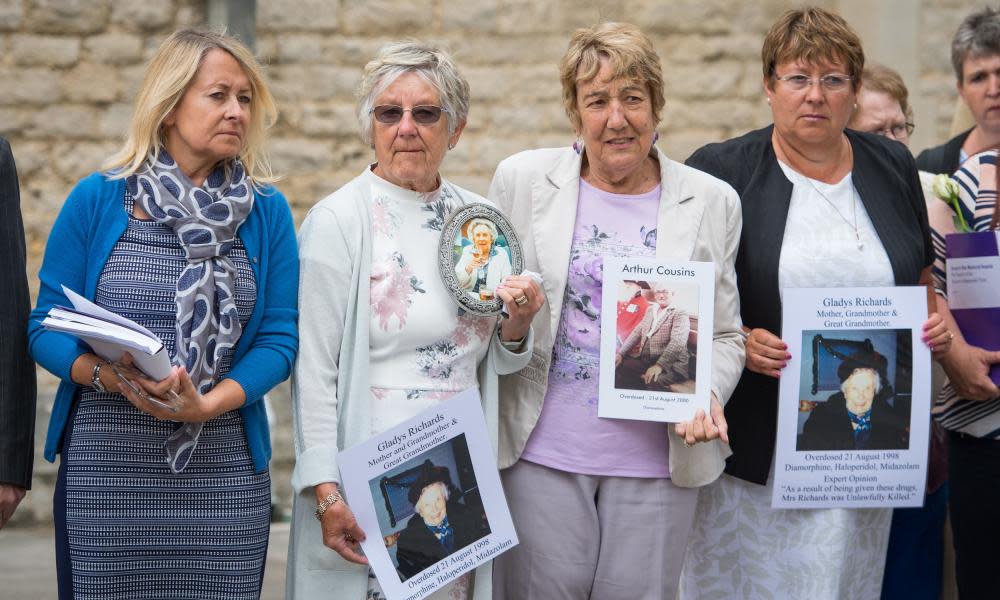Call to hold officials to account for Gosport deaths 'cover-up'

Senior officials who rebuffed families asking why their elderly relatives died at Gosport War Memorial hospital should be held to account and answer for the distress they caused, a patient safety charity has said.
A major report into deaths at the Hampshire hospital in the 1990s found on Wednesday that 456 patients had died after being prescribed opioid drugs which they did not need, such as diamorphine, by the now-retired GP Jane Barton.
A panel of experts, led by the former bishop of Liverpool James Jones, said there was an institutional practice of using life-shortening drugs and that consultants were aware of what Barton was doing, while nurses gave the drugs and the pharmacist dispensed them.
The health secretary, Jeremy Hunt, apologised to the families in the House of Commons and later said that hundreds of lives could have been saved if whistleblowers had been encouraged come forward.
The families say they want to see those responsible prosecuted, and Hunt said the Crown Prosecution Service and police should look at the report.
However, Peter Walsh, the chief executive of Action against Medical Accidents (AvMA), which helped some of the families get inquests for their relatives in 2009, said it may be difficult to bring criminal charges.
“Gross negligence manslaughter is still an option, but every time they have looked at it so far, the police and CPS have said there isn’t enough evidence.”
People, however, could be held to account for how the situation was handled, he said.
“Senior people all the way through to ministers knew that the families were right and yet they continued to pooh-pooh them and suppress information.
“I think that the families and wider public will only have confidence if some people are seen to be held to account for the failure to act and for keeping a lid on this and what people have described as a cover-up.”
Suzanne White, the head of clinical negligence at Leigh Day, said the law firm would be “watching carefully” as the CPS considered the evidence, but the civil courts might be an alternative option for the families.
“Other legal avenues open to the families include challenging the decision not to have an inquest into the death of a loved one,” she said. “The fact that out of the hundreds of deaths at the Gosport War Memorial hospital there appears to have only been 11 inquests is shocking.
“Families may also look to the civil courts to bring a claim against the hospital under the Human Rights Act. In this way they can also seek to uncover the truth about how a loved one died … If the CPS decide that they aren’t bringing criminal charges then the decision could be challenged, as could the actions of the police in the scandal.”
Prof Sir Brian Jarman, the head of the Dr Foster unit at Imperial College London, said similar situations were probably happening elsewhere.
However, Dr Eileen Burns, the president of the British Geriatrics Society, said the culture within the NHS had changed. “It’s obviously difficult to categorically say this could never ever happen anywhere, but I think there are lots of reasons why we can be reasonably optimistic that it is not likely to be happening currently. Culturally, things have moved on quite a long way.”
Burns said the unquestioning authority of doctors had significantly diminished and they now worked in teams with nurses and other specialists. A nurse would not be afraid to make suggestions to a doctor about the level of pain relief a patient needed.
Staff were expected to contribute anonymously to any doctor’s annual appraisal, where they could raise concerns, she said, and hospitals had regular reviews of all patient deaths to see whether anything could have been done better.
Burns said the deaths at Gosport were terrible but she feared the fallout might cause the pendulum to swing too far away from the use of pain-relieving drugs at the end of life when they were needed.
“We need to be very careful we get the balance right,” she said. “We need to treat every single person as an individual as much as possible.”

 Yahoo News
Yahoo News 
